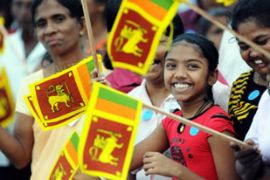Sri Lanka rebels ‘concede defeat’
LTTE decides to lay down arms after admitting the conflict had reached a “bitter end”.

LTTE chief’s fate
Mahinda Rajapakse, the Sri Lankan president, had declared the previous day that the Tigers had been “defeated,” after the military said it had captured the last area of coastline held by them.
“I am proud to announce … that my government, with the total commitment of our armed forces, has, in an unprecedented humanitarian operation, finally defeated the LTTE,” he told a summit in Jordan.
| Focus: Sri Lanka | ||||||

|
He returned to the capital, Colombo, on Sunday to street celebrations.
Despite the claim of victory, the whereabouts of Velupillai Prabhakaran, the leader of the Tigers, remain unknown, and hundreds of thousands of civilians are still either on the move or in camps for the internally displaced.
Narayan Swamy, editor of Indo-Asian News Service and author of Tigers of Lanka: From Boys to Guerrillas, told Al Jazeera: “It is highly unlikely that Prabhakaran would ever surrender or show the white flag.
“It is possible he may die fighting, it is possible he may commit suicide. As of now, there are conflicting reports about his whereabouts and the whereabouts of his top associates. There is no definite confirmation.
“Being captured alive would be the ultimate humiliation for a man who took on the Sri Lankan state with the view of breaking it up and forming an independent Tamil homeland.
“It is clear he has failed in his objective. That is bad enough.
“There are certain legitimate Tamil grievances, that’s why the international community has repeatedly been telling the Sri Lankan government to get its act together,” Swamy said.
Civilian displacement
The Sri Lankan ministry of disaster management and human rights said on Sunday it was continuing to process civilians rescued from the fighting.
Rajiva Wijesinha, a secretary at the ministry, told Al Jazeera from Colombo: “We heard that the last of them [civilians] had been saved. This was one of our great priorities in the last couple of weeks to make sure we got the civilians safely away.”
 |
| The Tigers had been fightng for a separate homeland for 25 years [AFP] |
Amin Awad, a representative of the UN refugee agency, said “almost all the population in the conflict zone – about 60,000 – had left”.
He told Al Jazeera that the displaced were being “processed at the Omanthai crossing point. That leaves very few, if any, people in the conflict zone”.
Both the government and the Tamil Tigers have been criticised for not allowing civilians safe exit from the area and for precipitating a humanitarian disaster.
The Tamil Tigers had been fighting for more than 25 years for a homeland for ethnic Tamils in the north and east of the country, arguing that they were marginalised by the ruling majority Sinhalese government.
Rajavarothiam Sampanthan, the leader of the Tamil National Alliance, told Al Jazeera that the defeat of the Tamil Tigers did not mean the end of the Tamil struggle.
“The Tamil struggle started long before the Tigers were born and will continue after the end of the Tigers,” he said from Chennai in India.
“The Tamils have always demanded self-determination, which would mean substantial self-rule in the areas of their historical habitation.”
‘Sick and hungry’
James Elder, a spokesman for Unicef, told Al Jazeera that civilians from the conflict zone were still arriving “sick and hungry” and that women and children were malnourished.
“This latest massive influx of people who have endured those extreme conditions is going to put even greater strain on those camps,” he said.
“These camps are being created by the government, which argues they are on the basis of state security and the time needed for mines to be cleared before resettlement can occur.
“At the same time, it is urgent that the government comes out with very clear screening and separation policies and a timeline so those who are termed non-combatants are allowed freedom of movement and are allowed to resettle.”
About 200,000 civilians have escaped the war zone in recent months, while more than 7,000 are believed to have been killed in fighting since January.
